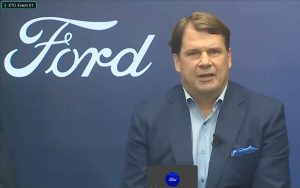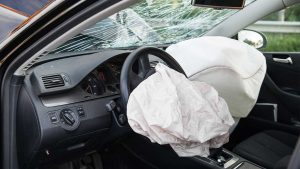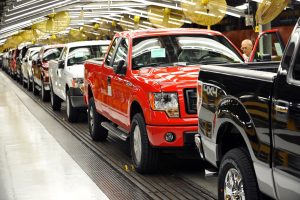Ford agreed to pay one of the largest fines in automotive history for dragging its feet on a 2020 recall covering 700,000 vehicles while also failing to give federal regulators timely information. It’s the latest in a costly series of quality and safety problems impacting Detroit’s second-largest automaker.

The Ford recall covered a total of 700,000 vehicles, including 2020 Explorers, across North America.
The National Highway Traffic Safety Administration has levied its second-largest penalty ever against Ford Motor Co. for moving too slowly to make repairs involving about 700,000 SUVs, pickups and vans. The Detroit automaker also failed to provide information about the problem to the safety agency, as required by law.
All told, Ford may have to pay as much as $165 million in penalties, though $55 million of that is, for now, being deferred. The fine stands as the second-largest in NHTSA’s 54-year history
It’s an embarrassing setback for an automaker that has struggled to deal with a variety of quality and safety issues in recent years that have hammered its balance sheet and damaged its public reputation.
The recall
“Timely and accurate recalls are critical to keeping everyone safe on our roads,” NHTSA Deputy Administrator Sophie Shulman said in the statement. “When manufacturers fail to prioritize the safety of the American public and meet their obligations under federal law, NHTSA will hold them accountable.”
The problem involves defective rear-view cameras that, owners reported, could go blank when vehicles were shifted into reverse. NHTSA said Ford should have known there was a problem due to mounting warranty claims – which it revealed to the agency during an August 2020 meeting. A recall finally was initiated on September 23, 2020.
A total of 700,000 vehicles in the U.S. were covered by the service order, 620,000 of those in the United States. The models covered were 2020 versions of the Ford Edge, Escape, Expedition, Explorer, F-150, Mustang, Ranger and Transit, as well as the Lincoln Corsair and Nautilus.
Ford eventually did two more recalls to correct the problem, covering 24,000 more vehicles in 2022 and then 2024.
Ford’s response
The problem was not just failing to respond to a known defect, as required under the Federal Motor Vehicle Safety Act, but also failing to provide accurate and complete information about the problem to NHTSA. The agency also concluded Ford was slow to respond with reports covering the second and third recall.
“We appreciate the opportunity to resolve this matter with NHTSA and remain committed to continuously improving safety and compliance,” the carmaker said in a statement.
The penalty is the second-largest in history for NHTSA, behind only the fines levied against Japanese supplier Takata for its role in producing faulty airbags and then failing to disclose and repair known defects.
The Takata problem was linked to 30 known deaths and at least 400 injuries worldwide. According to Ford data, there were no known injuries or fatalities linked to the rearview camera problem.
More Ford News
- Ford Raises “Significant” Safety Concerns Over Fuel Leak
- Ford Shifts EV Plans
- Ford Joins Ranks of Companies Cutting or Scaling Back Diversity Efforts
Ford’s nagging quality and safety issues

Among recent recalls, Ford called back 242,669 Maverick compact pickups due to a problem with the taillights.
Ford has struggled to deal with quality and safety problems in recent years. In September it again was forced to recall 144,000 of its Maverick pickups because of issues with their rearview cameras.
September saw another recall covering 91,000 SUVs due to potential engine failures. Last month it recalled a number of Bronco SUVs due to faulty suspension components. There were six recalls involving 200,000 Ford vehicles in August, and 550,000 of its pickups were covered by a service action announced in June.
Recalls can run up substantial costs due to repairs, but Ford has also struggled to deal with costs related to quality snags that don’t necessarily require recalls. And that has been one of the major reasons why Ford earnings fell short of expectations during the most recent quarter. CEO Jim Farley has made quality control a top priority but that has so far failed to bring the issue under control.
Getting a handle on the problem
Of the $165 million in fines levied by NHTSA, $55 million is being deferred, Ford agreeing to invest that in efforts to better control its safety issues.
Among other things, the automaker agreed to bring in an independent outside monitor who will oversee Ford’s response to safety issues over the next three years.
Under the order, an independent third party will oversee the automaker’s recall performance obligations for at least three years, and Ford has to cooperate with the monitor.
“Wide-ranging enhancements are already underway with more to come, including advanced data analytics, a new in-house testing facility, among other capabilities.” Ford said in its statement.










0 Comments